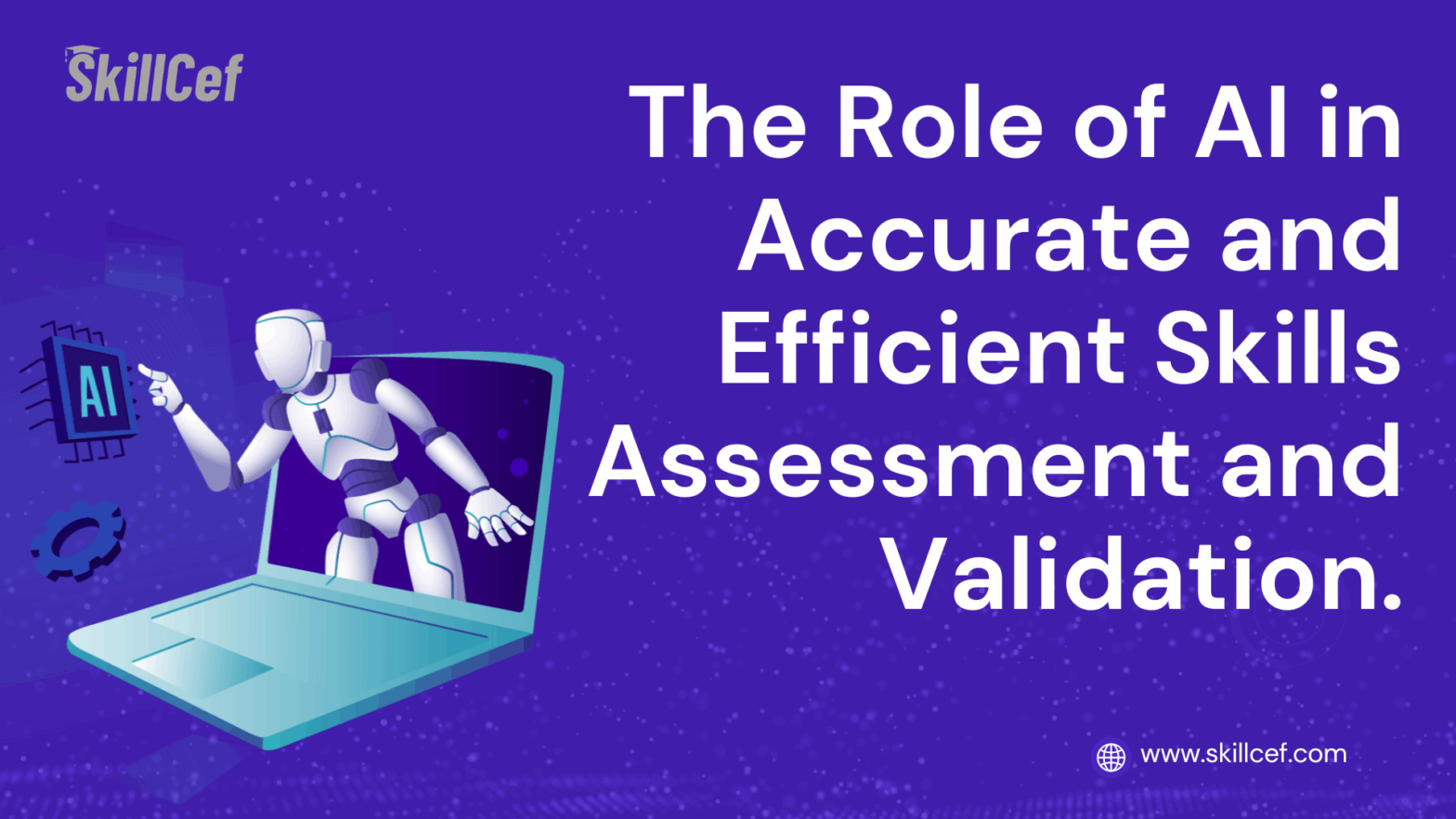
The Role of AI in Accurate and Efficient Skills Assessment and Validation
AI’s Role in Modern Talent. Organizations are moving towards a skills-first approach. Why a Skills-First Approach? This means focusing on a person’s abilities rather than just their educational background or past job titles. This change is important for businesses to stay competitive. Helping make this change happen is Artificial Intelligence (AI). AI is changing how we figure out and confirm what skills people have in the workplace.
AI’s Foundational Role in Skills Assessment and Validation
AI is making skills assessment and validation more precise and faster. Platforms that use AI technology give clear, dependable information about the skills of the people applying for jobs and those already working at a company.
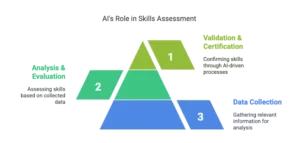
A big way, AI makes things more precise is, in evaluating and scoring skills fairly. Instead of just relying on opinions or looking quickly at resumes, systems using AI can score and rank people based on how they perform on skills tests and practice job tasks. This method uses data, which helps in making decisions with more confidence. It also helps find the most capable people effectively. Some platforms use machine learning to evaluate objectively and quickly. AI can also help check if someone is good at specific things, like assessing English communication skills based on known international standards.
The Speed Advantage of AI
Being faster is another main advantage AI brings to this process. AI platforms can automate many parts of hiring and managing talent. This includes tasks like replacing problems with logistics and technical issues during large tests with automation. AI helps identify top candidates more quickly. Companies have reported hiring faster and needing fewer interviews when using AI assessments. Some tools have AI builders for creating assessments, which makes creating assessments faster. AI can also help make sure tests are done honestly by employing cheat detection.
AI’s Role in Comprehensive Skill Architectures
Besides just testing, AI does a lot for understanding and confirming skills. It helps build skill structures that can change, create detailed lists and maps of skills, and match job duties with the right skills and abilities. AI allows checking skills from many sources. These sources can include test results, what people say about their own skills, what managers say, and information from HR systems. AI Skills Inference is one ability that lets platforms find skills from lots of candidate information. This turns information into useful facts for making decisions based on data. This gives organizations a good picture of the skills their employees have now and what skills they might need in the future.
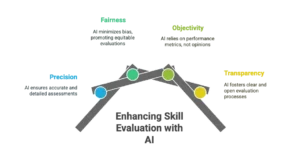
AI for Deeper Skill Insights and Talent Development
Using AI also helps with employee growth and moving up in a job. AI doesn’t just track job histories — it transforms them into actionable insights for better hiring and talent decisions. Some platforms have AI help for developers to learn and get better at their skills and perform their duties faster, like GitHub Copilot. Other systems give learning paths that are created for each person using AI. AI can also be used in hiring events. AI assistants can help set up code challenges quickly. Also, technology that uses AI for interviews is starting to be used to make the experience better for the person applying.
Evaluating AI-Specific Skills. As the working world uses more AI, skills assessment tools are also changing to check the abilities needed to work with, build, and use AI tools. This means making tests for newer skills people want, like knowing how to write instructions for AI. This shows AI is doing two things: it helps make assessment processes better and it helps find people with the skills needed for a future where AI is common.
The Transformative Power of AI in Talent Management
AI is making a big impact on skills assessment and validation. It is helping organizations adopt a skills-first way of doing things. By making assessments more precise through fair checking and using data, making things faster with automation, and allowing for deep understanding and checking of skills, AI helps companies make better choices about people, build groups of skilled workers, find skill gaps, and get an advantage as things change quickly. Using AI helps businesses make informed choices. It helps them build strong groups of skilled people, deal with shortages of skills, and finally, do better than others in a world that is always changing.
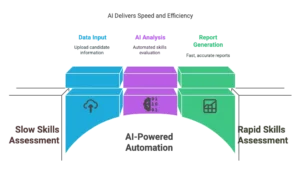
Strategic Workforce Planning with AI-Powered Insights
AI technology helps in making hiring choices based on information. Platforms using AI technology give information that helps make choices about the skills people have. This information is precise, dependable, and useful. The system helps make talent decisions that use data. This includes decisions about current employees and those who might join the company. The technology helps companies gain a deep understanding of the skills their employees have now. It also helps them predict what skills they will need later. By using this information, companies can address skill gaps. They can hire candidates who fit the job well, help current employees learn new skills, and move people to important work. The platform helps make informed talent decisions. It helps track how people are doing. It helps close skill gaps employees have using information from data. This approach means using skills data that helps you do things. Which means building a group of potential hires that is strong. And helps deal with not having enough skilled people. Therefore makes getting jobs easier for more people by looking at skills directly, not just how they got those skills.
Dynamic Skill Frameworks & Ontologies. AI assists in building frameworks for skills. These frameworks can change as needed. It helps make precise frameworks for skills that change to structure and improve your organization’s talent abilities as well. It uses detailed ways of organizing skills called granular skills taxonomy and skills ontology to build how jobs are structured in your organization based on skills. Job duties are matched with skills and abilities that are correct.
Multi-Channel Skill Validation
Checking skills can happen in many ways, with AI helping. This is called multi-channel skills validation. It includes getting confirmation through employees saying what skills they have, managers saying what skills people have, using information from systems used for learning or managing employee performance as people work, using AI to find skills from information, and using skills assessments.
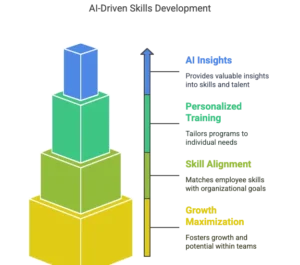
Continuous Skill Measurement and Workforce Understanding
The use of AI in skills assessment is also about measuring skills correctly. It provides information about the skills your employees have. It allows for checking skills continuously. This helps organizations understand their workforce to make better choices. It helps companies of all sizes make their hiring easier and helps find the most suitable candidates. Moreover, it can support employees so they can learn and do well in the company. The platform provides information that helps improve the career profiles of employees. It helps make better decisions.
Tangible ROI: Case Studies in AI-Powered Efficiency
One important aspect AI improves is the efficiency of screening candidates. For example, a bank assessed many candidates by using automation features to solve problems with how tests were given and technical issues. Another company improved its hiring speed with an automated hiring system that helped identify a large percentage of candidates for the final hiring step. For finding people with data science skills, one company found that the assessment process was simpler with a tool that helped identify top candidates and make job offers quickly. Using these tools helped companies like one that saved many hours of interview time by running many candidate tests. This time saving is like gaining enough time to start a new product or enter a new market.
AI technology helps with fairness in the hiring process. It helps reduce unfairness by making the process consistent and fair for everyone applying for a job. This involves using data, not just personal feelings, to guide decisions. Assessments are designed with tools for people doing interviews and standard steps to help with this. Platforms use information that helps make decisions based on data. People applying are measured on how well they do tasks that are like the tasks in the job. This gives a report with details for each candidate to help you make decisions you can trust, supported by data. People applying are ranked by how well they do, which makes finding the best candidates easy.
Preparing for the AI-Powered Workforce
The use of AI includes supporting the evaluation of skills for technical jobs. For engineering teams, technical assessments based on skills are used. These assessments are based on research. They help map skills of teams, find skill gaps, check candidates, and build the team needed now and for the future. Companies trust how well these technical assessments predict future job performance. The platforms have used knowledge from people who study how to assess people for jobs. This knowledge is put into every part of the platform. The goal is for everyone using the platform to be able to use assessment methods based on proof.

In the technical area, AI also helps evaluate the skills needed for a future that uses a lot of AI. This includes identifying and checking the skills needed to work with, build, and use AI tools. Tools are being developed to assess skills like AI prompt engineering, which are becoming more common. This shows how the skills people need are changing with AI. The way companies find, hire, and help technical employees learn is also changing. Platforms are changing their offerings to meet these needs. For example, one platform helps people get better skills and find jobs, and an AI Mock Interviewer helps people get ready for interviews. An AI assistant helps set up hackathons quickly. An AI tutor helps developers learn as they go. Advanced information helps understand the skills of the organization.
Enhancing the Candidate Experience
AI also helps with making the experience better for candidates. Features that ensure testing is done honestly have a strong effect on how candidates feel about the process. It helps assure them that their skills and abilities are what is important. Some platforms offer a hiring process that stands out by using company branding and giving feedback tailored to each person. People who used these systems have given them high ratings for their experience. The process helps make scheduling simpler and gives feedback quickly, improving the company’s image. It provides tools for evaluating people when not in the same location.
The ROI of AI in Assessment
The impact of AI on skills assessment can be seen in measured results. Companies using skills assessments have reported reducing hiring mistakes. They have also checked many more candidates. The time it takes to hire has been reduced by using a platform. For instance, one company cut hiring time by months, which they saw as a big help.
Beyond just checking skills, AI contributes to a deeper understanding of talent. AI-driven information helps make decisions based on data. This helps track performance and can provide learning paths made just for individuals. Which also connects people with matching job opportunities. For businesses, it provides information about how people are learning to improve what they offer. This means that it helps access candidates whose skills have already been checked. And thereforehelps find skills within a company. It helps developers show their skills and get recognition.
Final Thoughts
AI is also used in features that ensure test integrity. For example, AI-powered systems can detect copying. Some platforms can check if the webcam was on or if the mouse was active during a test. This helps ensure fairness.
Skillcef is designed as a central hub for learning, testing, and career growth. This integration is key because it connects all the necessary components for personalized development.
Platforms like Skillcef are at the forefront of this transformation, offering AI-powered solutions that streamline hiring, facilitate employee development, and connect individuals with the right opportunities. As the demand for skilled workers continues to grow in an increasingly AI-driven world, the adoption of these innovative technologies will be crucial for organizations seeking to thrive. Want to learn more about implementing an AI-driven skills strategy? Reach out to our team of engineers, and let’s discuss your project idea.
